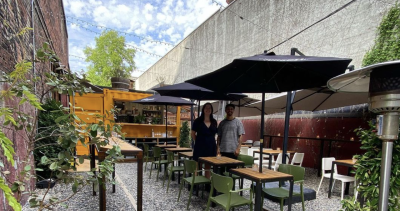Australian trio the Necks makes more sound than seems possible
Townsville, the latest CD from the Necks, is a dreamy, hypnotic, shimmering delight that draws serious beauty from simple means. The disc contains a single 45-minute-long track built from an ever-shifting array of small motifs; there are no grand statements here. But as those small motifs ebb and flow, something vast comes into being.
At times, the music seems far too intricate and layered to have been generated by piano, bass, and drums. You'd swear that synthesizers were involved, or digital looping devices, or a seventh hand. But the Necks eschew technology, and Townsville was recorded live. Still, there's more going on here than seems possible, and I'm not imagining this. Necks bassist Lloyd Swanton hears it too.
“That's one of the happy accidents that we love to bring about,” he explains, checking in on his cellphone from a Brooklyn tour stop. “I guess our music is about creating a framework where these things can happen that we have no control over. Time and again, people come up to us after a concert and say, ”˜Wow, I was listening and I thought “Who's the flute player? I can't see a flute player.”'
“I have my eyes closed for most of the performance,” he continues, “and I often wonder if someone's jumped up and started jamming with us.”¦But it's just the collision of the harmonics bouncing around the room—and that constantly reinvigorates my approach to this band, because it reminds me that even when you're dealing with the absolute basics of sound, the harmonic series, there are still things that are completely uncontrollable.”
Formed 21 years ago in Sydney, Australia, the Necks have released 14 CDs, most of them, like Townsville, focusing on long-form, meditative improvisations. These have some obvious precursors, including the more ecstatic forms of free jazz that Pharaoh Sanders and Marion Brown developed during the 1960s, the phase-and-pattern music American minimalist composers such as Steve Reich were inventing at around the same time, and the layered complexity of Indonesian music.
“My uncle died in a prisoner-of-war camp in Indonesia in World War II, and I'm intending to put together a project, probably a CD, of music based on elements of his story,” he reveals. “He wrote a diary in the prison camp, and there are various musical connections. So I've been investigating Indonesian music.”¦And it's been an absolute revelation to me.”
But that work-in-progress is a very different undertaking than a Necks show, in which Swanton, drummer Tony Buck, and pianist Chris Abrahams step on-stage without any notion of what they're about to perform.
“We just get up there and allow things to come out,” the bassist explains.
That the results are consistently fascinating attests to the band's uncanny intimacy, and to the presence of something that's rare in any musical form: magic.
The Necks play Performance Works on Saturday (February 21).















Comments